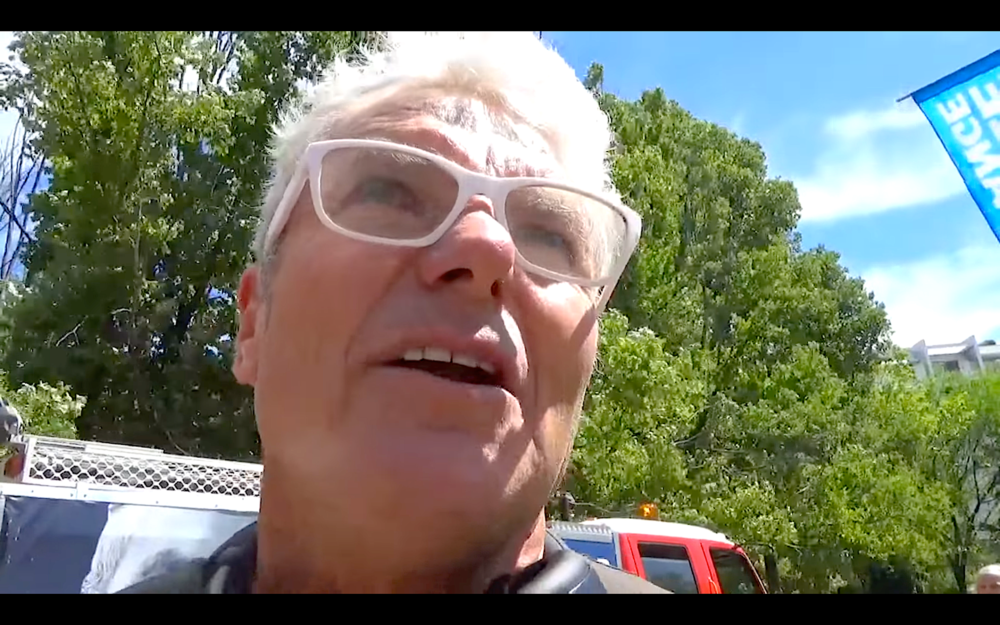On day two of the David McBride trial, the central question remains: whom does a soldier serve? Joe Lauria reports.
By Joe Lauria
in Canberra, Australia
Special to Consortium News
The prosecution and defense on day two of the David McBride trial sparred over the previous days’ testimony, conflicting again over whether a soldier has a duty to the nation, or only to his superior officers.
McBride, who served two terms in Afghanistan as a lawyer with the Australian Defence Force (ADF), has been charged in a five-count indictment for a trial that is expected to last three weeks.
The prosecution argued on Monday that McBride broke laws of military discipline by leaking to the Australian media. McBride’s lawyers conceded in court that he indeed broke such regulations but that he had a duty to the nation that superseded military discipline.
His leaks to the Australian Broadcasting Corporation revealed murders of unarmed Afghans by Australian soldiers.
Trish McDonald, the chief prosecutor, said the concept of duty in the law says it is not in the public interest to reveal classified information to the public.
McBride’s primary duty, she said, was to follow orders. The accused was a legal officer, she asserted. He was not appointed to inform the press. He contravened his official duty. In fact, there is a public interest in non-disclosure, the prosecutor argued.
The defense agreed that McBride had indeed broke military regulations but that he had a duty to the nation to do so and that his case should have been brought before a military tribunal.
On Tuesday, Stephen Odgers, the chief defence counsel, gave an example of two ships on a collision course with the captain under strict military orders not to reveal the location of his ship. The captain had to disobey the order to avoid a collision. It would be a breach of a lawful order, he said, which would be a matter for a military tribunal, not a civilian court.
Odgers also argued that an Australian soldier’s duty is based on oath to serve the British sovereign, whose duty is to care for the interests of the entire nation.
Whom Does A Soldier Serve?
At the heart of the case is the question: whom does a soldier serve?
“The defense arguments go nowhere,” the chief prosecutor responded to the court on Tuesday. The first thing to notice about the oath is the wording, she said, and the word is “serve.”
In the context of McBride, it meant “giving service to the Queen,” she said. “’Serve’ here does not mean act in the public interest. It means nothing more nor less than render service,” said McDonald.
She went on: “’Serve’ means to a commander, to fight for or to obey in military actions, not in the context of interpreting an oath.”
“To interpret ‘serve’ to mean to act in the pubic interest, is to turn on its head service to king or queen,” she said. It is not “for the soldier to do whatever he thinks is right.”
“Nowhere in the oath does it refer to public interest or that” a soldier “must act in the public interest,” she added. If it were, Parliament would have said so, she said.
McDonald quoted an 19th century reference on military justice and statutory powers, saying, “There is nothing so dangerous to the civil establishment of the state as an undisciplined or reactionary army.”
For the defense, Odgers countered that, “The duty to serve the sovereign does not require blind obedience to orders.” He asked that the judge instruct the jury on the law that would allow it to decide on this.
Odgers said in the “21st Century for the Crown to make the assertion that to obey unquestionably, the orders of superiors ignores Nuremberg and the acceptance in our society that members of the military have higher duties.”
The Nuremberg Tribunal that tried Nazi war criminals established that a soldier had a duty to disobey unlawful orders.
The defense has requested that McBride’s case be heard by a three-judge panel instead of the sole Justice David Mossop. Mossop is expected to render his decision on this on Wednesday.
A question remains after day two: why was McBride not tried in a military court, where the defense argues the case should properly reside? One possibility is that the Australian government’s motive in prosecuting McBride in a civilian court could be to satisfy U.S. pressure on the government to crack down on leakers.
A reluctance by the Australian government to investigate its alleged war criminals, rather than just the alleged leaker, could be based on the U.S. Leahy Law, which prevents the U.S. from selling military equipment to units of national armies convicted of war crimes.
Though 39 murders were identified by a government investigation, so far only one Australian soldier has been charged with murder in Afghanistan. The only other Australian on trial is McBride.
Joe Lauria is editor-in-chief of Consortium News and a former U.N. correspondent for The Wall Street Journal, Boston Globe, and numerous other newspapers, including The Montreal Gazette, the London Daily Mail and The Star of Johannesburg. He was an investigative reporter for the Sunday Times of London, a financial reporter for Bloomberg News and began his professional work as a 19-year old stringer for The New York Times. He is the author of two books, A Political Odyssey, with Sen. Mike Gravel, foreword by Daniel Ellsberg; and How I Lost By Hillary Clinton, foreword by Julian Assange. He can be reached at [email protected] and followed on Twitter @unjoe



A lay person understands the need for discipline in ADF. However, as the article makes clear, there are the precedents established by the Nuremberg trials, apart from many, that one should not obey a superiors’ orders if considered unlawful or unethical.
Most pertinently, this applies to the Israel-Gaza crisis currently unfolding. Under international human rights law, as explicated by Francesca Albanese, UN Special Rapporteur for Palestinian Human Rights, Israel is an occupying country and is perpetrating genocide and other war crimes. Effectively, every member of the armed services is personally responsible and cannot say ‘I was told to do it’. So too, according to Ms Albanese, are the enablers and weapons suppliers such as Australia.
The issue of ‘public interest’ requires to be tested further and too often ‘national security’ has become the go-to mantra of Australia’s security forces. This in itself requires further Parliamentary progressive intervention.
Nonetheless, the lay person has to witness in disbelief that only one ADF minor person has been charged for an Afghani murder whilst the rest have escaped justice. Instead, whistleblower David McBride has been persecuted for years by both Liberal and Labor Attorney Generals and now risks jail for having a duty to serve the Australian people, whilst the murderers and politicians escape free. Shame!
About Leahy Law aspect, I quote from the link to Wikipedia:
“To implement this law, the U.S. embassies, the Bureau of Democracy, Human Rights, and Labor, and the appropriate regional bureau of the U.S. Department of State vet potential recipients of security assistance.[3] If a unit is found to have been credibly implicated in a serious abuse of human rights, assistance is denied until the host nation government takes effective steps to bring the responsible persons within the unit to justice.”
That means that once the crimes are unveiled, then by the letter of Leahy Law, the specific unit(s) in which the crimes were committed will be denied US aid until proper steps to enforce the law upon the wrongdoers are made. As a whole, Australia committed enormous resources to her role in alliance with USA, the submarine program alone amounts to 10,000 USDs per Australian, allowing to better resist Chinese aggression about 10 years from now. Thus (a) USA will be inclined to interpret “effective steps” very leniently and (b) if not, Australian military needs to activate its military tribunal more widely, not a hardship.
Of course, military needs discipline, but who and when broke discipline? Were soldiers involved in atrocities commanded to do so? If yes, were their officers commanded to do so? Etc. If the soldiers went rogue, prosecution of McBride dangerously undermines the discipline. Mind you, communities of the affected Afghans knew what happened, and “strangely enough”, popularity of the government supported by USA with allies was very mediocre and morale of Afghan Army abysmal. The West lost by fostering corruption and atrocities. And the same question can be raised if the soldiers got illegal orders etc. Criminalizing whistle blowers, copied from the country that enacted Leahy Law, is very obviously against common sense principles of good government and interest of the public.
A wider issue is that the majority in USA and perhaps Australia too is tacitly convinced that they benefit from crimes committed on their behalf, this is the reason for CIA, special forces etc. But historical record does not support that optimism.
One gets the idea od why Assange is in such jeopardy in Australia and the U.S.